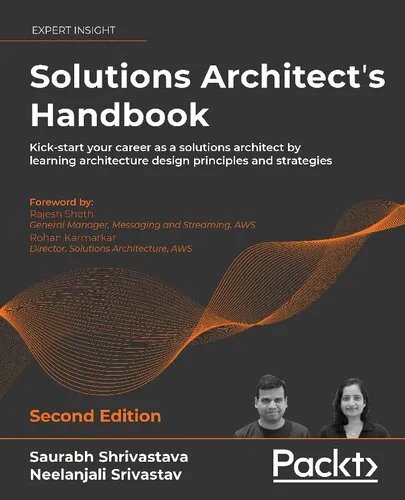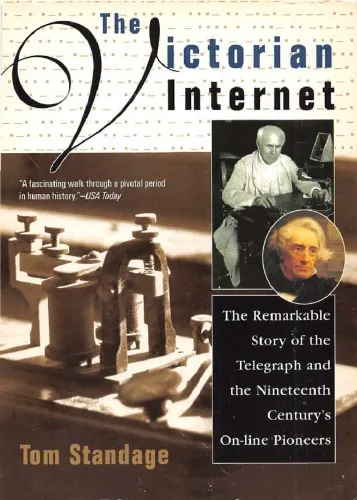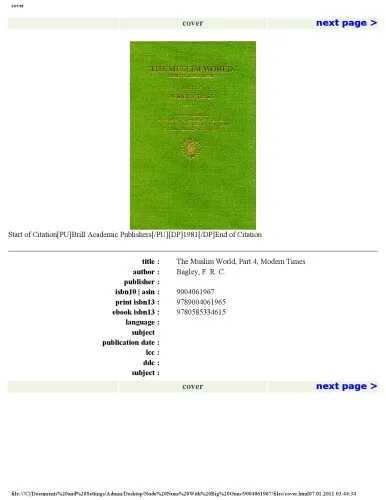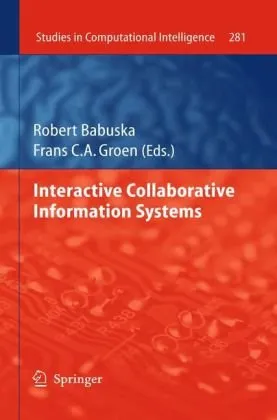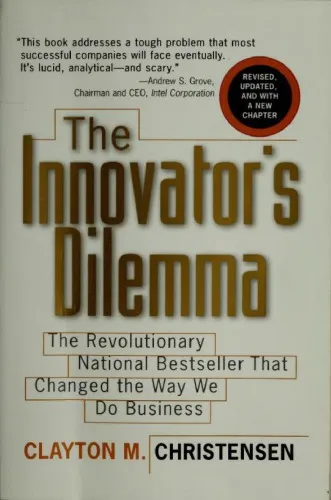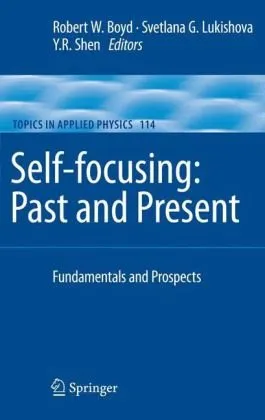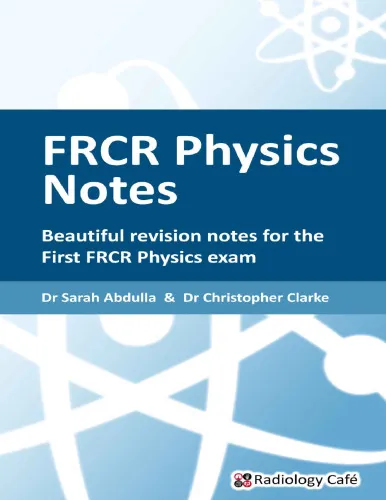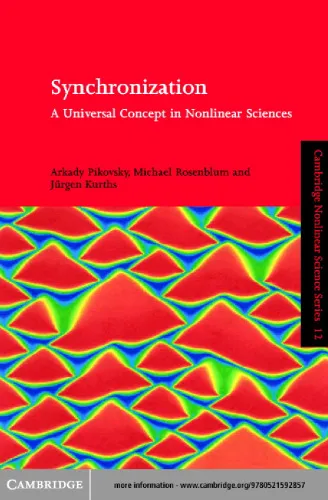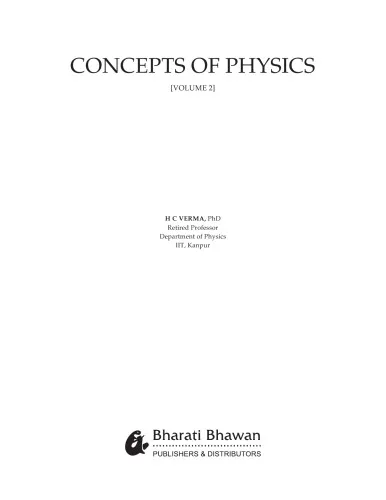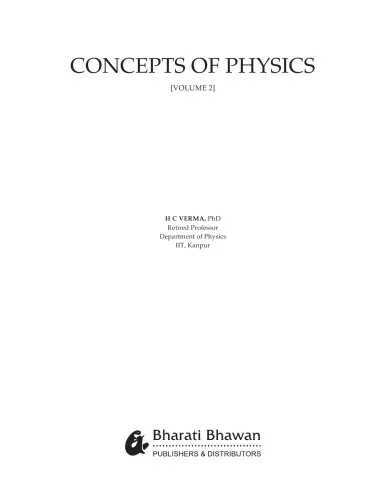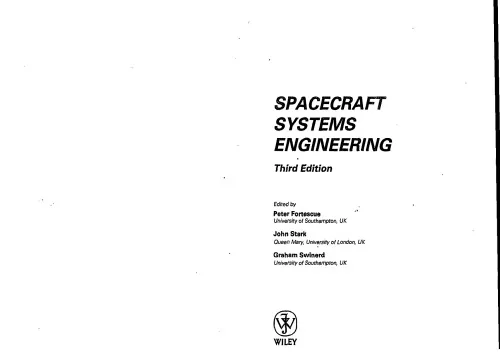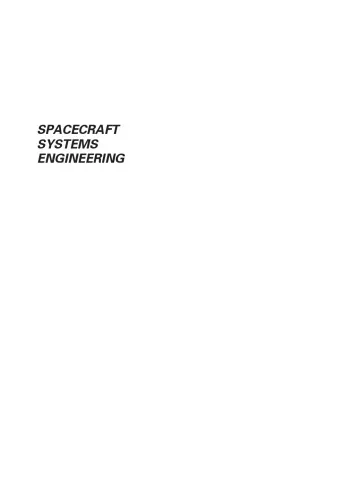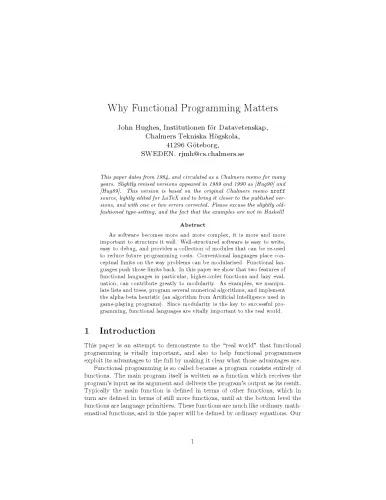Review of Scientific Instruments
4.3
بر اساس نظر کاربران

شما میتونید سوالاتتون در باره کتاب رو از هوش مصنوعیش بعد از ورود بپرسید
هر دانلود یا پرسش از هوش مصنوعی 2 امتیاز لازم دارد، برای بدست آوردن امتیاز رایگان، به صفحه ی راهنمای امتیازات سر بزنید و یک سری کار ارزشمند انجام بدینکتاب های مرتبط:
خلاصه تحلیلی کتاب
کتاب Review of Scientific Instrumentspp.025105 اثری تخصصی است که به بررسی دقیق طراحی، بهینهسازی و استفاده از ابزارهای علمی در حوزههای مختلف پژوهشی میپردازد. این اثر، با تکیه بر دادهها و رویکردهای مستند، تصویری روشن از مبانی کارکرد دستگاهها و تکنیکهای بهبود عملکرد آنها ارائه میدهد. برخلاف بسیاری از متون مشابه، تمرکز این کتاب صرفاً بر معرفی تجهیزات نیست، بلکه به تحلیل روششناسی و کاربردهای آنها در شرایط واقعی نیز توجه ویژهای شده است.
نویسندگان، با بهرهگیری از تجربه و تخصص چندجانبه خود، طیفی گسترده از موضوعات را پوشش میدهند؛ از سنجشهای اپتیکی گرفته تا فرآیندهای دقیق دادهبرداری. این کتاب برای پژوهشگران حوزه مهندسی، فیزیک کاربردی و علوم میانرشتهای منبعی ارزشمند محسوب میشود و بهگونهای تدوین شده که هم برای استفاده دانشگاهی و هم صنعتی قابلاعتماد باشد.
با توجه به گستردگی مفاهیم، خواننده به صورت تدریجی با اصطلاحات تخصصی، نکات فنی و مثالهای عملی آشنا میشود. استفاده از تصاویر و نمودارها به فهم بهتر مباحث کمک میکند و باعث میشود پیچیدگیهای ابزارهای علمی، جنبهای ملموس و کاربردی پیدا کنند.
نکات کلیدی و کاربردی
یکی از ویژگیهای برجسته این کتاب، ارائه راهکارهای عملی و جزئیات فنی برای بهبود دقت و کارایی ابزارهای آزمایشگاهی است. نویسندگان با تشریح محدودیتها و مزایا، به پژوهشگر کمک میکنند تا دستگاههای خود را متناسب با نیازهای پروژه تنظیم و کالیبره کند.
از دیگر نکات کلیدی میتوان به توجه ویژه به روشهای نوین پردازش داده اشاره کرد. این بخش، با ارائه مثالهای واقعی، به خواننده نشان میدهد که چگونه میتوان دادههای حاصل از ابزارهای پیشرفته را به شکلی دقیق تحلیل و تفسیر کرد.
مطالعه Review of Scientific Instrumentspp.025105 برای کسانی که با مفاهیمی چون noise reduction، signal processing و calibration سروکار دارند، حاوی نکات بسیار ارزشمند است. همچنین، فصولی که به مقایسه تکنیکها اختصاص دارند، معیارهای روشنی برای انتخاب بهینه ابزار ارائه میدهند.
نقلقولهای ماندگار
برخی گزارهها و ایدههای مطرحشده در کتاب، بهدلیل عمق و دقت علمی، ماندگار و الهامبخش هستند. این جملات، فلسفه کاری نویسندگان و emphasis آنها بر دقت علمی را بهخوبی بازتاب میدهند.
هر ابزار علمی تنها بهاندازهای دقیق است که روش اندازهگیری پشت آن، سنجیده و بهینه شده باشد. نامشخص
پژوهش مؤثر زمانی شکل میگیرد که ابزار، کاربر و دادهها در هماهنگی کامل باشند. نامشخص
چرا این کتاب اهمیت دارد
در دنیای امروز که دقت و صحت دادهها مبنای تصمیمات علمی و صنعتی است، تسلط بر ابزارهای سنجش و فهم عمیق آنها نیازی حیاتی محسوب میشود. Review of Scientific Instrumentspp.025105 بهعنوان مرجعی پرمحتوا، به پژوهشگران کمک میکند تا از ظرفیت کامل ابزارهای خود بهرهبرداری کنند و مانع از بروز خطاهای قابلپیشگیری شوند.
این کتاب همچنین پلی میان نظریه و عمل ایجاد میکند. بهجای محدود شدن به چارچوب تئوری، نویسندگان با ارائه مثالهای کاربردی نشان میدهند که چگونه دانش فنی میتواند در محیطهای واقعی پیادهسازی شده و نتایج ملموسی به همراه داشته باشد.
برای پژوهشگران تازهکار، این اثر همچون راهنمایی گامبهگام است که مسیر یادگیری و استفاده از تجهیزات علمی پیشرفته را هموار میکند. برای محققان باتجربه نیز، فرصتی برای کشف نکات ظریف و بهروز در حوزه کاریشان فراهم میآورد.
Analytical Summary
The book Review of Scientific Instrumentspp.025105 stands as a highly detailed and methodical examination of modern scientific instrumentation, particularly within the realm of optical measurement and environmental monitoring. Authored by Arnold, I. J.; Berger, C.; Chakrabarty, R. K.; Moosmüller, H.; Sharma, N.; and Mazzoleni, C., this work embodies the rigor expected by professionals and academics who rely on accurate and robust measurement systems for their research.
Drawing from years of collective expertise, the authors analyze the design, calibration, and performance evaluation of specialized instruments. Precision is not merely a theme here—it is the foundation upon which the entire discourse is built. The discussion transcends basic theory, moving into comparative assessments of methodologies, innovative engineering approaches, and the practical realities faced when deploying instruments in diverse environmental conditions.
Although the exact publication year is noted as “Information unavailable” due to the lack of reliable public sources, the text remains a timeless reference for those engaged in both academic research and applied science. It offers tested frameworks for instrument development and provides insight into the challenges of achieving reproducible results at the forefront of measurement science.
Key Takeaways
Readers delving into Review of Scientific Instrumentspp.025105 will leave with structured knowledge about the principles and practices that define precision scientific work.
An emphasis on optical instrumentation guides much of the narrative, showing how advances in materials, sensor design, and calibration protocols converge to improve measurement reliability.
The text encourages a mindset where measurement techniques are not static, but evolve alongside technological innovation and environmental demands. Through its analytical framework, professionals can adapt methodologies to fit diverse experimental scenarios.
The integration of case studies reinforces the importance of context—illustrating how the same instrument might behave differently depending on field conditions, maintenance regimes, and data interpretation approaches.
For academics, the book provides a bridge between theory and practice, cementing its value as a teaching tool and a research reference.
Memorable Quotes
"Accurate measurement is the heartbeat of science; without it, the rhythm of discovery falters." Unknown
"Instrumentation is not merely a tool, but an extension of the scientist's inquiry." Unknown
"Calibration turns possibility into precision." Unknown
Why This Book Matters
In a scientific era that demands ever-increasing accuracy, Review of Scientific Instrumentspp.025105 provides the depth and reliability needed to drive meaningful progress.
Its relevance stretches beyond a single discipline. While optical instrumentation and measurement techniques form the core, its principles can be applied to physics, chemistry, environmental science, and engineering. The book promotes rigorous methodology, urging readers to understand not only how to use instruments, but why their design and calibration choices matter.
For professionals designing next-generation sensors, or academics developing coursework rooted in real-world challenges, this text is an indispensable resource.
Inspiring Conclusion
The enduring value of Review of Scientific Instrumentspp.025105 lies in its commitment to precision, adaptability, and applicability across scientific domains.
By immersing themselves in its pages, readers gain not only technical knowledge but also an appreciation for the meticulous craft behind every measurement. As technology continues to evolve, the principles articulated here remain a beacon for academics, researchers, and practitioners committed to excellence in instrumentation.
We invite you to engage with this seminal work—read it critically, share its insights with your peers, and discuss its implications for the future of measurement science. Your next step begins by opening Review of Scientific Instrumentspp.025105 and allowing its precision-focused wisdom to guide your practice.
دانلود رایگان مستقیم
شما میتونید سوالاتتون در باره کتاب رو از هوش مصنوعیش بعد از ورود بپرسید
دسترسی به کتابها از طریق پلتفرمهای قانونی و کتابخانههای عمومی نه تنها از حقوق نویسندگان و ناشران حمایت میکند، بلکه به پایداری فرهنگ کتابخوانی نیز کمک میرساند. پیش از دانلود، لحظهای به بررسی این گزینهها فکر کنید.
این کتاب رو در پلتفرم های دیگه ببینید
WorldCat به شما کمک میکنه تا کتاب ها رو در کتابخانه های سراسر دنیا پیدا کنید
امتیازها، نظرات تخصصی و صحبت ها درباره کتاب را در Goodreads ببینید
کتابهای کمیاب یا دست دوم را در AbeBooks پیدا کنید و بخرید
1331
بازدید4.3
امتیاز0
نظر98%
رضایتنظرات:
4.3
بر اساس 0 نظر کاربران
Questions & Answers
Ask questions about this book or help others by answering
No questions yet. Be the first to ask!


